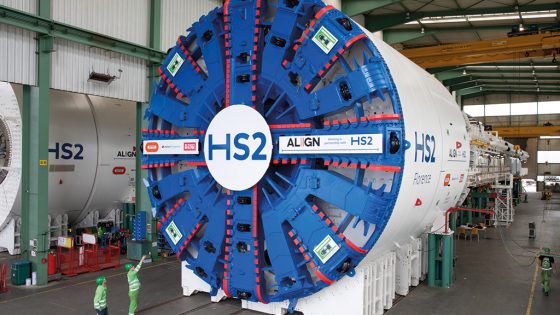HS2 plans to renegotiate its contracts with the joint ventures delivering the London-Birmingham rail scheme as part of a “fundamental reset” of the delivery programme.
HS2 chief executive Mark Wild, who started in his role earlier this month, told a meeting of parliament’s Public Accounts Committee yesterday there would be no re-procurement of already agreed HS2 contracts.
But he said that the project would immediately “bear down on costs”, especially on the under-way main works civils elements.
HS2 chief financial officer Alan Foster told the committee that contractors themselves accept that their contracts can be changed.
“There’s a recognition that we need to find a better alignment of incentives between the taxpayer and the delivery of the works.
“We are looking at how we can make variations to those incentive mechanisms and find a way so that they can work better for both parties,” he said.
“This is clearly something where we have to reach a compromise but there are opportunities there for improvement, and we do see that as an intrinsic part of the reset.
“I’ve personally spoken to all of the CEOs of the parent companies.
“We’ve got 14 significant entities that sit above the JVs, and all have expressed a willingness to discuss and work through a renegotiation.”
Liberal Democrat MP Sarah Olney expressed scepticism that the contractors would accept any significant changes to contracts they have agreed.
But Wild said they would be because it is in their interest, and that of their shareholders, to work on a project that is at a lower overall risk than it would otherwise be.
Wild declared previous cost control work on the scheme as a “failure” and “unacceptable”.
“It’s clear to me […] that HS2 in its core mission to control costs – deliver this for the lowest feasible cost – has failed,” he said.
Wild, who ran London’s Crossrail project from 2018 until 2022, said he has identified three main issues on HS2:
- Construction starting “way too early” before mature designs had been developed;
- HS2 bosses not manging risk-sharing with contractors adequately; and
- Assumptions on productivity, developed in 2019 being totally wrong.
On the contracts, he said that the project company willingly took on risk.
“I don’t mean to criticise people, it must have been very challenging, but the fact is the transition of risk from the supply chain to HS2 has resulted in a situation where our contracts are basically cost reimbursable and HS2 must manage the risk profile.
“I don’t think HS2 has [managed the contracts] in a coherent way.”
Wild said it would take another 18 months to develop a new baseline for the programme – with timescales and cost estimates – due to the previous errors.
“That may seem an extraordinary amount of time,” he admitted.
“I got this wrong at the beginning of [my time at] Crossrail. We tried to set the baseline within six months, and it was proven to be too optimistic.”
It was also revealed that a new estimated timeline for the megaproject, or details of how Euston Station will be funded and built, would not be ready for 18 months.
Alan Over, director general of the Department for Transport’s major rail projects group, told the committee that establishing a delivery model and financial assumptions for the Euston Station build, which was announced in October 2023 as to be delivered using private finance, would also take until 2026.
The project is proceeding there on the basis of former prime minister Rishi Sunak’s desire for six platforms at the station, but in a manner that could be changed if future government’s extend the rail project beyond Birmingham, he said.
“We do want to make sure our successors will have that option so we’re actively planning for future proofing at the HS2 station that would make provision for a possible extra three platforms, or possibly four platforms, next to the ones that we have a concrete plan to build,” he said.
Yesterday (19 December) Construction News reported that transport secretary Heidi Alexander had informed parliament that an estimate made by officials at HS2 Ltd in June that the entire line would cost between £54bn and £66bn was neither “accurate or reliable”.
This is because HS2 Ltd did not take into account the cost reductions due to private funding for Euston Station, she said.
Earlier on Thursday (19 December) it was announced that a Siemens Mobility / Costain JV is preferred bidder for a £300m contract to deliver high voltage power supply systems for HS2 throughout the entire route between London and Birmingham.

